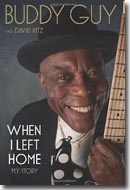 Buddy Guy has become one of the Elder Statesmen
of the Blues right before our eyes. Over the past
20 years, Guy has enjoyed wide exposure, a
recording contract with a major label, multiple
Grammy Awards and Blues Music Awards, TV
appearances, and shows no signs of slowing down at
age 76. Seemingly at the height of his fame, it only
seems natural that Guy would release his
autobiography (with assistance from David Ritz),
When I Left Home – My Story (De Capo Press).
Buddy Guy has become one of the Elder Statesmen
of the Blues right before our eyes. Over the past
20 years, Guy has enjoyed wide exposure, a
recording contract with a major label, multiple
Grammy Awards and Blues Music Awards, TV
appearances, and shows no signs of slowing down at
age 76. Seemingly at the height of his fame, it only
seems natural that Guy would release his
autobiography (with assistance from David Ritz),
When I Left Home – My Story (De Capo Press).
Guy begins with his hardscrabble upbringing in rural
Louisiana, working in the fields with his family. At
a young age, he developed an interest in music, and
his parents encouraged him to pursue it, eventually
moving him to Baton Rouge to live with a sister in
order for him to find a better job. It was during
his time in Louisiana that he met his greatest
musical inspiration, Guitar Slim, and received a
guitar from a mysterious benefactor.
After recording a demo in Baton Rouge, Guy is
encouraged by family and friends to migrate to
Chicago and try to grab the brass ring. Guy
introduces us to an amazing cast of characters and
fills the book with compelling anecdotes that range
from humorous. to frightening, to sad, to uplifting.
We also experience Guy’s frustrations as he attempts
to build a career despite tough financial
conditions, trying to raise a family, unscrupulous
record people, and criminally low wages whether
performing gigs or working in the studio. Guy
probably doesn’t have to worry about money anymore,
but the hardships of the ’50s and ’60s still linger.
Guy also devotes several chapters to his
relationship with the mercurial Junior Wells. Though
the two enjoyed a lengthy musical partnership, it
was not without its rough spells. Guy pulls few
punches, with revealing details about Wells and
other musical associates, such as Leonard Chess,
Willie Dixon, and his Windy City mentor, Muddy
Waters. The legendary story of a starving Guy
meeting up with Waters (who made him salami
sandwiches) is recounted here, and Guy acknowledges
that without Waters, he probably would have gone
back to Louisiana, but Waters wasn’t without his
faults.
Guy also acknowledges his debt to other bluesmen,
like Otis Rush, Earl Hooker, Magic Sam, John Lee
Hooker, B.B. King, Otis Spann, and many others.
These artists are included in the numerous
anecdotes, which are easily the highlight of the
book. Guy’s memory is impeccable and blues fans will
love to hear these stories from the viewpoint of
someone who was actually there.
Guy also devotes time to the many blues/rock artists
who have been influenced by him, such as Eric
Clapton, Paul Butterfield, Mike Bloomfield, Jimi
Hendrix, and Stevie Ray Vaughan. The section devoted
to Vaughan’s death is especially poignant, as are
chapters devoted to Waters’ decline and passing and
Little Walter’s demise.
If you’re not a fan of Buddy Guy before you start
reading When I Left Home, you will be when you’re
finished. Guy, despite his penchant for flash and
flair onstage, comes off as a soft-spoken, humble
man while recounting his story. Any readers
interested in post-war Chicago Blues, and modern
blues will want to get their hands on this book.
--- Graham Clarke
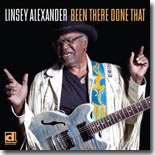 For the last 15 years, Linsey Alexander has
been The Man on Chicago’s North side blues scene
with regular gigs at Kingston Mines, B.L.U.E.S.,
Legends, and Blue Chicago. A powerful and
charismatic performer, he excels on guitar, playing
in a number of styles, with his soulful vocals, and
as a fine songwriter. He’s recorded several discs
over the past few years, but Been There Done That is
his debut release for Delmark.
For the last 15 years, Linsey Alexander has
been The Man on Chicago’s North side blues scene
with regular gigs at Kingston Mines, B.L.U.E.S.,
Legends, and Blue Chicago. A powerful and
charismatic performer, he excels on guitar, playing
in a number of styles, with his soulful vocals, and
as a fine songwriter. He’s recorded several discs
over the past few years, but Been There Done That is
his debut release for Delmark.
The new disc was recorded live in the studio with a
nine-piece ensemble that includes Mike Wheeler and
Breezy Rodio on guitars, Roosevelt Purifoy on
keyboards, Greg McDaniel on bass, and James Wilson
on drums, plus the LA Horns (Ryan Nyther – trumpet,
and Bryan Fritz – tenor sax), plus an appearance by
harmonica legend Billy Branch on three tracks.
Alexander wrote or co-wrote 11 of the dozen
tunes, many of which are standouts, including “Bad
Man,” which also benefits from some great Albert
Collins-like lead work from Rodio, “I Had A Dream,”
which features a scorching solo from Alexander, the
mellow soul/blues title track. Other songs, like
“Going Back To My Old Time Used To Be,” and the cool
update on the Robert Johnson lore, “Saving Robert
Johnson,” mix elements of modern funk with the
blues.
The band is really in the zone on these
tracks…..only two overdubs on guitar tracks were
needed. Branch shines on his three numbers --- the old
school opener, “Raffle Ticket,” “The Same Thing I
Could Tell Myself,” and the outstanding “My Mama
Gave Me The Blues.” The disc’s lone cover is “Looks
Like It’s Going To Rain,” a heartfelt tribute to the
late Windy City blues mainstay, Willie Kent.
Alexander sounds great on vocals, his guitar work is
versatile, providing the perfect mix of traditional
and modern, and he does a great job on his
songwriting, breathing new life into familiar blues
themes. Been There Done That proves that there’s
still plenty of great blues being played every night
in Chicago and Delmark is doing an excellent job
helping to spread the good news.
--- Graham Clarke
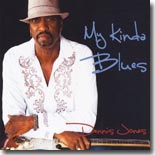 For powerful blues/rock of the hightest order, look
no further than Dennis Jones on his latest CD,
My Kinda Blues (Blue Rock Records). Jones unleashes
13 sensational tracks (12 self-penned)
that combine powerhouse music (courtesy of Jones –
guitar, Michael Turner – drums, and Samuel Correa –
bass) with some of the most original, honest
songwriting you’ve heard in a while.
For powerful blues/rock of the hightest order, look
no further than Dennis Jones on his latest CD,
My Kinda Blues (Blue Rock Records). Jones unleashes
13 sensational tracks (12 self-penned)
that combine powerhouse music (courtesy of Jones –
guitar, Michael Turner – drums, and Samuel Correa –
bass) with some of the most original, honest
songwriting you’ve heard in a while.
Jones doesn’t waste any time. “Jesus or the Bottle”
mixes actual news sound bites with some scathing
lyrics about televangelists backed by a hard-driving
boogie beat. The mood lightens on the next track, a
humorous country blues cut, “Same Train,” that
features harmonica and background vocals from Kenny
Neal. The rocking title cut is next, and Jones makes
it clear what his “kinda” blues really is. “Text Us
Girl” is a clever composition that bemoans the
texting/twittering craze.
Next, Jones takes his
rocking blues to the Windy City with the late Dave
Thompson’s Chicago-style shuffle, “You Took My
Baby,” featuring Guitar Shorty on a pair of blazing
solos. All that’s missing is a Junior Wells
harmonica break.
“I Want You” is another funny song about that
kind of no-good woman that you just can’t stay away
from. “Never Go Away,” about the exasperating
qualities of relationships, pumps up the funk as
Jones laments “How can I miss you, if you never go
away.” The pensive “Best That I Can” slows the pace
briefly before literally jumping into the topical
“They Say."
“Good For Me” is a strong blues/rocker with lyrics
that hit as hard as Jones’ guitar riffs and solos.
“One More Dance” is a sensual swampy blues that
slowly builds into Jones’ gripping guitar solo.
“Devil’s Nightmare” is a bracingly sober look at
things apocalyptic, wondering how far away the end
may be.
The disc closes with a long instrumental,
“Baltimore Blues,” that begins with a Magic Sam-like
West Side riff, but covers a lot of additional
ground in it’s seven-plus minutes running time.
If you like raw and ragged, well-written blues/rock,
you will probably agree that Dennis Jones’ “kinda”
blues is your “kinda” blues, too. Don’t miss this
one.
--- Graham Clarke
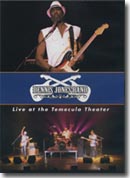 Also released in conjunction with My Kinda Blues is
the DVD, Dennis Jones Band: Live at Temecula
Theater. This set features a whopping 18
tracks and finds Dennis Jones and the band in fine form, as
they blaze through songs from each of their three
previous CDs, plus “Best That I Can” from their
latest release.
Also released in conjunction with My Kinda Blues is
the DVD, Dennis Jones Band: Live at Temecula
Theater. This set features a whopping 18
tracks and finds Dennis Jones and the band in fine form, as
they blaze through songs from each of their three
previous CDs, plus “Best That I Can” from their
latest release.
The performance is filmed in a pretty
straight-forward manner….there’s no bells and
whistles or special effects, just the band playing
their tunes. Jones doesn’t showboat or try to fit
every note into every solo. He just plays each tune
with the maximum intensity and power. Turner and
Correa are rock solid in their backing.
Standout tracks include “Kill the Pain,” “Brand New
Day,” “Hot Sauce,” “Him or Me,” “I’m Good,” “Big
Black Cat,” “Super Deluxe,” and “Try Not To Lie.” In
addition, there are four bonus tracks that are as
strong as the rest, especially “Something Good,” a
slow burner, and the Jimmy Reed-based “You’re
Wrong.”
Live at Temecula Theater offers a compilation of
Dennis Jones’ best work for newcomers and is a
pretty impressive representation of their live show
that will please longtime fans as well.
--- Graham Clarke
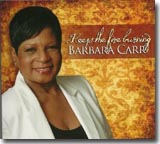 After years of toiling away with limited success
(including a stint with Chess Records in the ’60s
and early ’70s), soul/blues singer Barbara Carr
finally hit her stride in the late ’80s and early
’90s, culminating in a successful decade with Ecko
Records, where she cultivated the image of a tough,
brassy, take-no B.S.blues mama with songs like “Long
on Talk, Short on Love,” “Bone Me Like You Own Me,”
“Bit Off More Than You Can Chew,” and “If the Lord
Keeps the Thought of You out of My Head, I'll Keep
Your Booty out of My Bed.”
After years of toiling away with limited success
(including a stint with Chess Records in the ’60s
and early ’70s), soul/blues singer Barbara Carr
finally hit her stride in the late ’80s and early
’90s, culminating in a successful decade with Ecko
Records, where she cultivated the image of a tough,
brassy, take-no B.S.blues mama with songs like “Long
on Talk, Short on Love,” “Bone Me Like You Own Me,”
“Bit Off More Than You Can Chew,” and “If the Lord
Keeps the Thought of You out of My Head, I'll Keep
Your Booty out of My Bed.”
That image is downplayed somewhat on Carr’s latest
release, Keep the Fire Burning (Catfood Records),
but it doesn’t matter a bit. Carr has one of the
more distinctive voices singing soul/blues these
days with her deep, sultry, warm style. On this
album’s list of songs, mostly written by fellow
Catfood artists Johnny Rawls, Sandy Carroll, and Bob
Trenchard, the focus is more on conventional
soul/blues than Carr’s usual repertoire, but Carr’s
vocals are so good and evoke so much passion,
whatever the song, longtime fans won’t care and
newcomers will buy in completely.
Carr sounds magnificent on songs like “Hanging On By
A Thread,” “Moment of Weakness,” the deep soul
ballad “We Have The Key,” and the excellent title
track. The more blues-oriented tracks (“You Give Me
The Blues” and “I Got The Blues”) are equally
effective, thanks to the naturally gritty edge in
her vocals. Another highlight is the duet with
Rawls, “Hold On To What You’ve Got,” which would
have fit seamlessly into the catalog of classic Stax
duets from the ’60s.
The band (Catfood’s house band, The Rays….Trenchard
– bass, Richy Puga – percussion, Johnny McGhee –
guitar, Dan Ferguson – keyboards, Andy Roman – sax,
Mike Middleton – trumpet, Robert Claiborne -
trombone) is wonderful and the background singers
are also an added treat. The Iveys (Arlen, Jessica,
and Jillian Ivey) handle this duty on several
tracks, and Monica Gutierrez and Candace Reyes split
duties on a couple of other tracks.
Keep the Fire Burning should satisfy longtime
Barbara Carr fans and should serve as a great
introduction for new listeners. Years of hard work
are paying dividends for the singer, and she’s still
at the top of her game.
--- Graham Clarke
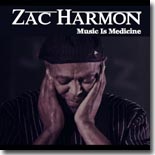 It’s been three years since Zac Harmon’s last
release, 2009’s From The Root. Since that time, he’s
won several awards, including a lifetime achievement
award at the 2009 Jackson Music Awards in his
hometown of Jackson, Mississippi and a pair of awards given
by the Jus’ Blues Foundation (including their 2011
Best Contemporary/Traditional Male Blues Artist),
plus he entertained the troops in Iraq and Kuwait
during the Bluzapalooza tour and became one of the
few blues acts to actually perform in Egypt at the
site of the Great Pyramids and the Sphinx. Thank
goodness he found time to release a new album of his
exciting brand of blues, which mixes elements of
soul, funk, gospel, and R&B effortlessly, and this
latest disc, Music Is Medicine (Urban Eagle LLC),
ranks as his best so far.
It’s been three years since Zac Harmon’s last
release, 2009’s From The Root. Since that time, he’s
won several awards, including a lifetime achievement
award at the 2009 Jackson Music Awards in his
hometown of Jackson, Mississippi and a pair of awards given
by the Jus’ Blues Foundation (including their 2011
Best Contemporary/Traditional Male Blues Artist),
plus he entertained the troops in Iraq and Kuwait
during the Bluzapalooza tour and became one of the
few blues acts to actually perform in Egypt at the
site of the Great Pyramids and the Sphinx. Thank
goodness he found time to release a new album of his
exciting brand of blues, which mixes elements of
soul, funk, gospel, and R&B effortlessly, and this
latest disc, Music Is Medicine (Urban Eagle LLC),
ranks as his best so far.
“Miss American Girl,” the track that opens the disc
would be a smooth fit on most of today’s R&B albums,
with Harmon’s pleasant vocals and stinging lead
guitar, the cool backing vocals, and the timeless
up-tempo pop feel of the music and the lyrics. I
could have pictured Kool & the Gang cutting this
track back in their heyday. “Blue Pill Thrill” about
that magical pill that makes mountains out of
molehills, opens with a muscular Albert King-esque
guitar intro that meanders through the track, which
also has a really funky bass backdrop.
The next track is a searing track, “Running From The
Devil,” touching on the eternal bluesman’s battle
between the sacred and the secular. “Grandma’s
Prayer” is a soulful gospel number, Harmon’s
tribute to his grandmother and her strong faith,
that mixes Harmon’s sweet vocals with the voices of
keyboard player Corey Lacy and drummer Cedric
Goodman. “Drowning in Hollywood” is a taut rocker
about struggling to make it in the Big Time, and
“Country Boy” is driven by a bluesy “Mannish Boy”
groove and hypnotic background vocals from Lacy and
Goodman, Harmon testifies about his upbringing and
the advice he got from his mama and seemingly
threatens to tear his guitar into shreds.
“I’d Rather Be With You” is a light and lovely
reggae tune, and “Talk To Me” brought a smile to my
face and it reminded me of those late ’70s R&B tunes
that I grew up listening to. “Wounded” is a pop/soul
ballad penned by BR Millon and Gregg Wright (who
both play guitar on the track), with Harmon and
Sueann Carwell trading vocals. “The Healer” takes
the album title to heart and extols the virtues of
music and its healing strength. The closer,
“Joanna,” is a soulful blues track that finds Harmon
pleading for a second chance.
The Zac Harmon Band (Lacy, Goodman, and bass player
Buthel) sound fantastic, as do the guest musicians (Millon,
Wright, keyboardist/drummer Christopher Troy, who
also co-produced the disc with Harmon, drummers
Ralph Forrest and Lavell Jones, and bass player
James Strong). Harmon really does an excellent job
on guitar and vocals, plus he also plays keyboards,
bass, and drums on selected tracks.
A smooth ride, Music Is Medicine is a classic set of
modern blues, incorporating elements of the new and
the old into an exciting mix that should be drawing
a lot of attention at the end of the year, when
everybody does their Top Ten lists. It will more
than likely be on mine.
--- Graham Clarke
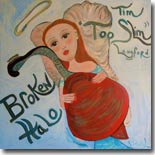 I’ve been trying to listen to Broken Halo, the new
solo acoustic CD from Tim “Too Slim” Langford, for
several weeks now. Langford, who’s usually rocking
the shingles loose at clubs and joints everywhere as frontman of the Taildraggers, decided to go acoustic
on his first solo effort. If you’re familiar with
Langford, you know that hard as he rocks the house,
it’s also worthwhile to stop and listen to what he’s
saying in his songs as well. This disc is no
exception to the rule….hence my dilemma. Every time
I would sit still long enough to plug it in and try
to take it in, countless interruptions would ensue.
Finally, I holed up in a small dark place and gave
it a spin.
I’ve been trying to listen to Broken Halo, the new
solo acoustic CD from Tim “Too Slim” Langford, for
several weeks now. Langford, who’s usually rocking
the shingles loose at clubs and joints everywhere as frontman of the Taildraggers, decided to go acoustic
on his first solo effort. If you’re familiar with
Langford, you know that hard as he rocks the house,
it’s also worthwhile to stop and listen to what he’s
saying in his songs as well. This disc is no
exception to the rule….hence my dilemma. Every time
I would sit still long enough to plug it in and try
to take it in, countless interruptions would ensue.
Finally, I holed up in a small dark place and gave
it a spin.
Broken Halo rewards from the opening chords of the
haunting instrumental that opens the disc, “La Llorona” (translated “The Weeping Woman,” which is
also an old Hispanic legend). Langford’s mournful
slide work on dobro really sets the pace for the
disc. “Three Chords” continues the somber pace,
reflecting on the very short time we have to make
our mark on love or life. “Shaking A Cup,” tells of
the plight of the homeless to a Hooker-esque boogie,
and “You Hid It Well” is a raw and ragged Delta
blues track about alcoholism and denial.
“Princeville Serenade” is a lovely instrument,
played on ukelele overdubbed with ukelele slide,
that really sounds cool.
“40 Watt Bulb,” about a struggling musician, is
chilling, with its coarse lyrics and with Langford’s
weathered and weary vocals. The title track is next
and is a more upbeat rocker, with something of a
“Suzie Q” rhythm, about falling in love with a woman
who’s experienced a few bumps along the road of
life. “North Dakota Girl” and “Dollar Girl” are both
songs about female companionship, one song about
looking for the right woman to settle down with, the
other about settling down temporarily.
“Long Tailed Black Cat” is a wonderful slice of
blues, an original tune about bad luck that would
have easily fit in with the early ’50s Muddy Waters.
The closer, “Gracie,” is a heart-rending tune about
Langford’s grandmother, who passed away in 1971.
It’s a wistful look about not really appreciating
people until it’s too late. Langford really bares
his soul on this one, and its something anyone who’s
lost a loved one can relate to.
Broken Halo is a gentle, mellow masterpiece, and
maybe one of the more personal blues albums you will
hear. Langford obviously had this in the works for
some time, because its nearly perfect in production
and execution. If you’re a fan of acoustic blues,
you will want to have this one, but there’s much
more to enjoy.
--- Graham Clarke
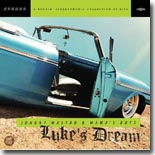 Johnny Mastro & Mama’s Boys have been a part of the
southern California blues scene since the early
’90s, but have built a worldwide following, having
toured Europe over 20 times. Their sound adeptly
mixes the modern with the traditional. Mastro
handles the vocals and plays superlative harmonica,
while guitarist Smokehouse Brown channels the blues
from Muddy Waters to Elmore James to Jimi Hendrix.
Actually, that’s a pretty good definition of the
band’s sound, too.
Johnny Mastro & Mama’s Boys have been a part of the
southern California blues scene since the early
’90s, but have built a worldwide following, having
toured Europe over 20 times. Their sound adeptly
mixes the modern with the traditional. Mastro
handles the vocals and plays superlative harmonica,
while guitarist Smokehouse Brown channels the blues
from Muddy Waters to Elmore James to Jimi Hendrix.
Actually, that’s a pretty good definition of the
band’s sound, too.
Mastro says that their latest release, Luke’s Dream
(Rip Cat Records), started out as a traditional
blues record, “but it took a wild turn and never
really came back so I just rode the wave.” The disc
is a wild ride, a breath of fresh air in the world
of sterile blues too often cut from the same mold.
There are four acoustic tracks present, such as the
title track, a country-tinged blues that kicks
things off, but the majority of the album is
no-holds-barred sizzling electric blues that almost
grabs you by the throat with “Thunder Roll.” “Knee
High,” “Hurt,” “Francine,” and “My Rocket.” The
power and energy on these tracks may cause the paint
to peel from your walls.
Champion Jack Dupree’s “Junker Blues,” bears little
resemblance to the original with the crunching slide
work from Brown, but that will be fine for most
listeners. “Mr. JJ’s Man” is a more traditional
rocker, with some fine harp playing from Mastro,
while “Tonight We Ride,” showcases more of Brown’s
scorching fretwork along with Mastro’s harmonica.
The acoustic track, “Spider,” is another keeper with
some great interaction between Mastro and Brown, and
the faithful cover of Little Walter’s “Roller
Coaster” is very good, too.
Perhaps the most unusual tune on the disc is the
closer, “Temperature.” It’s seven minutes plus of
mind-blowing, out-of-this-world blues/rock with that
features the band with former Tito & Tarantula
guitarist Peter Atanasoff laying down some molten
guitar licks with Brown.
Other special guests include guitarists Kirk
Fletcher and Scott Abeyta, and percussionist Max
Bangwell and Lisa Cee. Luke’s Dream is for those
blues fans who like their blues with a jagged edge.
Though Johnny Mastro & Mama’s Boys have a foot
planted firmly in the traditions of the blues, they
definitely like to go 21st century as well. This may
not be your daddy’s blues, but it’s a worthy
successor.
--- Graham Clarke
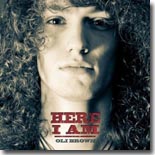 Oli Brown made quite an impression in 2012, with his
sophomore effort for Ruf Records. Heads I Win Tails
You Lose, produced by legendary British producer
Mike Vernon, was rated among the Top Ten releases
for several publications, and was named Best Album
at the 2011 British Blues Awards.
Oli Brown made quite an impression in 2012, with his
sophomore effort for Ruf Records. Heads I Win Tails
You Lose, produced by legendary British producer
Mike Vernon, was rated among the Top Ten releases
for several publications, and was named Best Album
at the 2011 British Blues Awards.
Brown’s follow-up, Here I Am, is produced by Wayne
Proctor, and there seems to be more a focus on
Brown’s singing and songwriting this time around.
The title cut opens the disc with Brown proclaiming
defiantly that he wants to be his own man. That vow
of independence moves to “Thinking About Her,” one
of the standout tracks on the disc, definitely more
of the bluesiest. “All We Had To Give” is another
blues track, about the end of a relationship.
Brown’s songwriting is solid, and tracks like “Devil
In Me,” “Manic Bloom,” and “Remedy” back that up
strongly. ‘Stinger Missile,” the closing track, is a
scorcher as well, featuring Paul Jones on harmonica.
There are also a pair of covers that are somewhat
off the beaten path. “I Love You More Than You’ll
Ever Know,” Al Kooper’s tune, forever associated
with Donny Hathaway, allows Brown to really step up
vocally, and he is more than up to the assignment.
Nikka Costa’s “Like A Feather” gets down and funky
and features Brown and fellow Ruf recording artist
Dani Wilde on vocals.
While the focus seems to have shifted somewhat to
Brown’s vocal talents this time around, rest assured
that he’s still given ample room to bend a string or
two. Backed by his “Dream Team” (Proctor – drums,
Scott Barnes – bass, Joel White – keyboards), he
continues to impress with his fretwork. If Oli Brown
continues to make albums like Here I Am, blues fans
will be able to look forward to years of listening
pleasure.
--- Graham Clarke
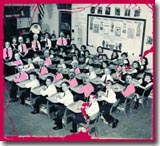 Paul Mark & the Van Dorens’ latest release,
Smartest
Man in the Room (Radiation Records), offers more
of the singer/songwriter/guitarist’s smart brand of
blues/rock. It’s packed to the brim with plenty of
raw, roughhouse guitar, hard-driving rhythms,
thought-provoking songs, and, of course, the
rough-hewn but soulful vocals of the frontman.
Paul Mark & the Van Dorens’ latest release,
Smartest
Man in the Room (Radiation Records), offers more
of the singer/songwriter/guitarist’s smart brand of
blues/rock. It’s packed to the brim with plenty of
raw, roughhouse guitar, hard-driving rhythms,
thought-provoking songs, and, of course, the
rough-hewn but soulful vocals of the frontman.
Mark’s songs touch on familiar blues themes……love,
loss, and regret, but they also touch on topical
issues as well, sometimes within the same song. The
title track is a not-so-subtle poke in the eye of
corporate America. “Time Will Tell,” a Texas
shuffle, is a highlight, as is “One More Coat of
Paint,” which is about a foreclosed home, or a
woman, or both, and “U Must Come 2,” a soul-drenched
slow blues with a great vocal from Mark and greasy
keyboard work from Dan Schnapp.
Mark plays piano on “Can’t Remember Nothing,” a
hilarious tune about encountering a long-lost love so
long-lost that he can’t remember her. “40 Feet of
Rope,” “When God Finds The Time,” and “The Creature
Walks Among Us” are prime examples of his ability to
blend his brand of roots music with his unique
perspective on the way things are in the world.
There are also several instrumentals, the
Latin-flavored “Barrio Stroll,” “Wrist Rocket,”
which has sort of a surf feel to it, The
slow-burning Texas rocker “Choke Hold,” and the
shimmering closer, “Road Hawg.” Mark also does a fun
cover of Bob Dylan’s “Don’t Ya Tell Henry.”
The disc was recorded in New Orleans and Memphis
with the Van Dorens, a rock solid unit that knows
how to groove (Schnapp – keyboards, James Strain –
bass, Paul Vezelis – drums). Other musicians include
Al Gamble on organ, Harry Peel on drums, and a sweet
trio of backup singers (Reba Russell, Stefanie
Bolton, and Susan Marshall).
Smartest Man in the Room will make you laugh, make
you move, and make you think, something that Paul
Mark has been giving us for the past 25+ years.
--- Graham Clarke
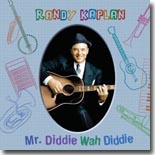 If you blues lovers have children and you would like
to introduce them to the blues, but you’re a little
reluctant to expose them to the sometimes “adult
content” of blues lyrics, allow me to introduce you
to Randy Kaplan, a New York-born, Los Angeles-based
musician, who is regarded as one of the finest
children’s performers in the country. Kaplan spent
over two years working on his latest effort, Mr. Diddie Wah Diddie (myKaZoo Music), a child-friendly
album of reworked blues song that will also appeal
to fun-loving adults, too.
If you blues lovers have children and you would like
to introduce them to the blues, but you’re a little
reluctant to expose them to the sometimes “adult
content” of blues lyrics, allow me to introduce you
to Randy Kaplan, a New York-born, Los Angeles-based
musician, who is regarded as one of the finest
children’s performers in the country. Kaplan spent
over two years working on his latest effort, Mr. Diddie Wah Diddie (myKaZoo Music), a child-friendly
album of reworked blues song that will also appeal
to fun-loving adults, too.
Kaplan revises 17 classic blues tunes
originally done by legendary artists like Robert
Johnson (“They’re Red Hot” and “Kindhearted
Babysitter Blues,” from “Kindhearted Woman Blues”),
Sonny Boy Williamson (“Runaway Blues,” from “Jackson
Blues”), Jimmie Rodgers (“In a Timeout Now,” from
“In the Jailhouse Now”), and other revisions of
songs from Blind Blake, Blind Boy Fuller, Muddy
Waters, Mance Lipscomb, Mississippi John Hurt,
Bessie Smith, and many others.
Though he changes the lyrics to make them more
“kid-friendly,” the music is the same and Kaplan
plays guitar and harmonica and leads a stellar band,
which includes Katie Euliss (upright bass,
percussion), the versatile Mike West (mandolin,
tenor banjo, 5-string banjo, bottleneck guitar,
acoustic guitar), Colin Mahoney (drums, percussion,
rosin-melted frying pan), Bradford Hoopes (piano),
Chris Leopold (trumpet), Tom Johnson (trombone), Ed
Judd (tuba), Cyndi Kroll Haupti (tap dancer), and
Erin Parr (washboard, percussion).
Kaplan is also accompanied by nine or ten young
children, who sing along, ask questions, tease and
otherwise carry on with him throughout the songs.
There’s also a narrator of sorts, named Lightnin’
Bodkins, a wizened old Delta character who’s seen it
all and fills in biographical information about the
blues legends, introduces songs, and tries to figure
out a blues nickname for Kaplan throughout the disc.
Also included are 20 pages of liner notes that
discuss the artists and the songs and the stories
behind them, so it’s a great opportunity for young
and old to learn about the blues. Randy Kaplan has
done a wonderful job helping youngsters learn more
about America’s musical heritage and making it fun
in the process. Mr. Diddie Wah Diddie is recommended
for all ages.
--- Graham Clarke
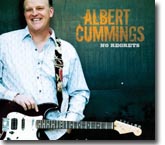 It’s no secret that I’m a big fan of Albert
Cummings. We booked him in Phoenix several years
ago and Albert blew everyone away with a
seven-minute version of “Voodoo Chile” that still
sits in my memory. Albert’s new disc, No Regrets,
releases on August 28th and it’s easily the single
best disc Albert’s done, and I’ve heard them all. So
let’s give it a listen.
It’s no secret that I’m a big fan of Albert
Cummings. We booked him in Phoenix several years
ago and Albert blew everyone away with a
seven-minute version of “Voodoo Chile” that still
sits in my memory. Albert’s new disc, No Regrets,
releases on August 28th and it’s easily the single
best disc Albert’s done, and I’ve heard them all. So
let’s give it a listen.
The party kicks off with a rousing introduction
as Albert’s Strat kicks out the opening bars of
“Glass House.” Here we find Albert admonishing a
past lover to be careful what she wishes for or pay
the consequences. “You’ve been telling people
things…that you know you shouldn’t say…better watch
yourself, babe…cause every dog has its day…you’ve
been living in a glass house, babe…better not throw
no stones!” Our tempo and tone slow down
considerably as Albert tackles a ballad, “500
miles.” “I’ve got my radio on…got my window rolled
down…and I can feel that cool night air…I don’t like
to be…out here on the road…but I know I’m almost
there…I’ve got 500 miles…before I wrap my arms
around you!” Albert’s been on the road and he’s so
happy to be coming around home to his woman. Its 500
miles to home and you know he’s going to get there!
“Eye to Eye” is another ballad that finds Albert
reflecting on a love gone by. “All the leaves are
falling…winter will be here soon…another year has
passed….since we’ve been apart…and I have learned to
live…with this hole in my heart…I don’t know
why….why we can’t see…eye to eye!” It just wasn’t
meant to be but the woman Albert loved definitely
has stayed in his memory and in his heart, they just
didn’t see “eye to eye."
Our next cut, “Checkered Flag,” finds Albert
kicking up the tempo and aggression as he admits
that the only thing that makes him feel alive is to
just get in his car and drive! “I put the pedal to
the metal and I give it all she’s got…my engine’s
really running and begging me to stop…but they won’t
catch me…this ain’t no game of tag…I’ll see you at
the finish line…I’m headed for the checkered flag!”
Knowing Albert, I can only imagine how fast he’s
driving toward that checkered flag.
Another ballad, “She’s So Tired,” is up next and
I hear Rick Steff on the keyboards in the
background, doing his thing. “She’s So Tired”
definitely has country influences as Albert tells us
the story of a woman who has definitely suffered her
share of pain. “As she sits in disappointment…never
giving up her style…she looks across the room…to see
a young man with a smile…so she asks him to join
her…and sit down for a spell…knowing in her
heart…where the night would lead so well…she’s so
tired of being lonely!” This woman is definitely
tired of coming in second best and is choosing a
different course tonight. “She’s So Tired,” with its
country influences, is definitely one of my favorite
cuts on this disc for sure.
Next up is “Your Day will Come.” Here we find
Albert confronting a passed lover who telling
everyone a different story from the truth. “I can
forgive…but I can’t forget…I live my live with no
regrets…you’re going to pay for what you have
done…your day will come!”
“Cry Me a River” finds Albert dealing with
another love gone bad. “And I don’t know…how I
missed all the signs….but I know…what goes
around…comes around…and you got yours….and I got
mine….cry me a river…cause I don’t care….I don’t
care anymore!” Albert’s definitely moving on and
it’s good to get this soured relationship behind
him. A blistering Strat intro provides the backdrop
for what I would consider a classic Albert Cummings
tune, “Drink, Party and Dance.” “It’s been a long
week at work…but man, I’m feeling good…I’m going to
call my friends…we’re going to party like we know we
should. We’re going to drink party and dance…all
night long!” Classic Albert and a great party tune
for sure.
Those of us who have seen Albert live know we’re
generally in for a high octane performance and on
“Foolin Me,” we find Albert calling out a woman who
is trying to play him. “All I needed…was just one
look…you’re too easy to read…just like a book…I
don’t know where you get your love…treat me a way…I
just don’t deserve…I don’t care who you are….who
you’re trying to be…I can see right through
you…cause…you’re not foolin me!”
On “Where You Belong,” we find Albert taking the
time to console the woman he truly loves in a very
touching ballad. “How long has it been…since you’ve
seen the sun really shine…as long as it been…since
you’ve stopped to read the signs….I can tell that
it’s been quite awhile…I can tell….because I miss
your smile….so cry on my shoulder…tell me what’s
wrong…just let me hold you in my arms…cause that’s
where you belong!” Albert can’t always read his
woman’s mind, but he’s definitely willing to try to
do the best he can to make her happy.
A rousing version of “Mannish Boy” follows and
then Albert closes out No Regrets with a
final ballad, “Home Town.” Here we find Albert
reflecting on life and the road and the feeling he
gets when he makes it back home. “I’m driving down
Main Street…now who knows who’ll you meet…it sure is
nice….to see old friends…familiar faces….and warm
embraces…it’s so good to be home again…and all the
things that I see….make me think carefully of my
life…and how I need to slow down…no matter where I
go…I always love to come back home…my home town!”
No Regrets finds Albert in that zone where
ability and maturity mesh to produce outstanding
music and you will find that here. The disc displays
Albert’s finest songwriting to date and the band
behind him is at the top of their game. He’s
definitely found his stride and is ready to hit the
road in fine fashion. You can find out more about
Albert and order this great disc from him on his
website at
www.albertcummings.com. Well done, Albert!
--- Kyle Deibler
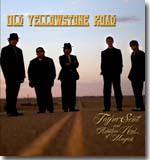 One of the highlights for me at this past
February’s International Blues Challenge was the
privilege of witnessing a young band from Cheyenne,
Wyoming tear up the competition and become the talk
of the town for the week-end. Taylor Scott and
Another Kind of Magick made a lot of friends
that week and it’s kind of sad to know that the band
has chosen to go their separate ways for a variety
of reasons, all of them good ones, at least for now.
But the band has chosen to go out in style,
releasing an EP to honor their fans and friends
they’ve made along the Blues Highway. Old
Yellowstone Road is the name of the disc and it
clearly shows the reasons the band has attracted a
very loyal following. So, let’s give it a spin and
give the band their due.
One of the highlights for me at this past
February’s International Blues Challenge was the
privilege of witnessing a young band from Cheyenne,
Wyoming tear up the competition and become the talk
of the town for the week-end. Taylor Scott and
Another Kind of Magick made a lot of friends
that week and it’s kind of sad to know that the band
has chosen to go their separate ways for a variety
of reasons, all of them good ones, at least for now.
But the band has chosen to go out in style,
releasing an EP to honor their fans and friends
they’ve made along the Blues Highway. Old
Yellowstone Road is the name of the disc and it
clearly shows the reasons the band has attracted a
very loyal following. So, let’s give it a spin and
give the band their due.
The first track up is “Welcome to the Blues,” and
the soulful tone of Taylor’s guitar leads the way.
It’s a fitting intro as Taylor implores us all to
stay awhile. “Welcome to the blues, y’all…take off
that coat and stay awhile…yea, baby, get up and do
that thing…cause my Blues…its got style!” Nic Clark
steps in with his usual brilliant harp fills and the
tune just goes on from there. The Uribe brothers,
Louie and Mike, are solid on the back end and now I
hear the piano fills from Tom Amend. A great way to
kick this disc off. Up next is a soulful ballad,
“Conversations with the Blues,” and again its
Taylor’s guitar leading the way. “Please excuse me
people…I gotta sit there and reminisce…about a night
I had a conversation with the Blues…and it went
something like this!” Taylor’s lamenting the life of
a Bluesman, no money in his wallet; no gas in the
car…about all he has left is a beat up guitar. The
soulful tunes emanating from his guitar emphasize
the trying times a Bluesman goes through but
Taylor’s a survivor and he’ll emerge from the pack.
I’m sure of that.
The third cut on the disc, “Days are Numbered (A
Song for My Friends),” finds Taylor giving thanks to
all of the bands supporters as he ponders his future
in the Blues. “And sooner or later…I gotta go
away…but I’ll always be coming back…won’t ever be
the same….I know there’s just one thing…I know I
can’t do…can’t forget about you!” The band has
developed a very loyal following among Blues fans
and I seriously doubt that any of us who have seen
them perform will ever forget them either. The Uribe
brothers provide the intro to “Walkin’ Pressure
Cooker” and Tom comes in behind them on keys to
provide the platform for this tune. Here we find
Taylor somewhat overwhelmed by everything going on
in his life. “I’ve been running on empty…for four or
five days…and when I get back home…everything’s in
disarray…everybody’s talking…can’t get a clue….they
got to tell me…what they want….and what I ought to
do….I’m a walking pressure cooker…could go off at
any time!” The truth of the matter is that Taylor is
very levelheaded, he’ll figure it out.
Another slow ballad, “Pulled From Under You,” is
up next and mournful tones from Taylor’s Gibson lead
the way. Here Taylor is discussing the worst kind of
Blues, when you’ve lost at love and are wondering
what the future will bring. “Sometimes…the most
convincing lies are told…by the way they look at
you…this is the worst kind of love…go out and find
somebody new…the rug is pulled out from under you!”
Old Yellowstone Road closes with “Can’t
Read Your Mind, Baby.” “I can’t read your mind,
baby…you won’t tell me how you feel….I just got to
know, baby….if what we got is real!”
The band surprises us with a non-titled bonus
track and it gives the listener one last call to
hear Taylor on guitar, Louie Uribe on bass, his
brother Mike on drums, Tom Amend on keys and last
but not least, Nic Clark on harp. The musicianship
of the band comes through completely and it’s easy
to see how they’ve developed such a loyal following
over the past few years. One thing is for sure, the
Blues isn’t done with them, not by a long shot. I’m
looking forward to hearing what the future has in
store for Taylor, Nic and the rest of the crew. Time
will tell, but I for one am glad to have run across
them on the Blues Highway. You can find out more
about the band at
www.anotherkindofmagick.com and try to catch one
of their last few performances if you’re anywhere
near them on the Front Range. It will definitely be
worth the trip!
--- Kyle Deibler
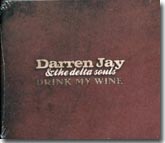 Memphis is a hard town for a Blues musician to
make a living. Competition for gigs is fierce and
only the cream of the crop is able to rise above the
fray. Those that do earn the respect of the elder
legends in the Bluff city, and such is the case with
Darren Jay & the Delta Souls. I’ve worked
with Darren Jay at several Blues Foundation
functions, so when my partner in crime at the Rum
Boogie, Robbie Rose, mentioned Darren’s new disc to
me. I knew I had to give it a listen. It goes
without saying that Robbie was right as usual, but
I’m going to give her credit anyway. Drink My
Wine is an excellent disc and some of Memphis’s
finest musicians backed Darren Jay & the Delta Souls
on this project.
Memphis is a hard town for a Blues musician to
make a living. Competition for gigs is fierce and
only the cream of the crop is able to rise above the
fray. Those that do earn the respect of the elder
legends in the Bluff city, and such is the case with
Darren Jay & the Delta Souls. I’ve worked
with Darren Jay at several Blues Foundation
functions, so when my partner in crime at the Rum
Boogie, Robbie Rose, mentioned Darren’s new disc to
me. I knew I had to give it a listen. It goes
without saying that Robbie was right as usual, but
I’m going to give her credit anyway. Drink My
Wine is an excellent disc and some of Memphis’s
finest musicians backed Darren Jay & the Delta Souls
on this project.
The first tune up on the disc is “Rider,” an
instrumental that gives everyone in the band a
chance to stretch their wings. The more than capable
bass of Laura Cupit holds down the back end, Tony
Thomas lends his keyboard wizardry on the organ,
while Darren is front and center laying down some
nasty guitar licks. I’ve not seen Darren play live,
but it’s definitely on my bucket list of things to
do.
“Workday Blues” is up next, and here we find
Darren Jay pontificating on a familiar theme, having
to go to work to make a living. “Well, I wake up in
the morning…put on my socks and shoes…make myself
some coffee….it’s the same old thing….same ole
workday blues!” The Memphis Horns make an appearance
on “Workday Blues” and provide a unique Memphian
touch to this tune. Another Darren Jay original,
“Drink My Wine” is up next, and Darren’s playing
some very blistering guitar. He’s normally such a
quiet guy to be around that it’s interesting to me
the expressive tones that come out of his guitar.
“I’m going to sit here til the morning…I’m going to
drink me a little wine…I’m going to sing about you
little darling…til the morning shines!” Darren Jay’s
in love and doing his best to make the best of a bad
situation. Better off to just let her go, Darren
Jay.
“Lovin’ Man” has this Zydeco backbeat that’s very
interesting as Darren Jay gets down to the meat of
the situation. “Little darling…how you feeling
tonight…do you need a loving man to feel alright?”
Darren Jay is definitely interested in pursuing this
girl if she’ll give him half a chance, and he’s
absolutely sure he’s the man for the job. Darren
Jay’s guitar is front and center as we move onto our
next cut, “Too Late Baby.” His relationship is not
working out and it’s time to move for him to move
on. “It’s too late baby…left me in misery.” You hear
the pain in the licks from Darren Jay’s guitar and
the feelings are amplified by more of Tony Thomas’s
organ work. The Willie Dixon classic, “Hoochie
Coochie Man” is up next and only one of two covers
on a disc that contains nine original tunes by
Darren Jay. “You know I’m him…everybody knows I’m
him…I’m the Hoochie Coochie Man…everybody knows I’m
him!”
At times Darren Jay’s guitar tones are very
bright, reminding me a little of Junior Watson, and
the exemplary back end bass provided by Laura proves
to be a good foil to his guitar. Such is the case on
“Everybody Get Together.” “Everybody get together
and have a good time…grab your friend and let’s make
it all rhyme!” “Tin Pan Alley” is the other cover
tune on Drink My Wine and has a very dark
side to it. “Down in Tin Pan Alley…seen what was
going on…it was some hot down there…I couldn’t stay
very long…alley’s the roughest place…I’ve ever
been…all the people down there….they’re looking for
the whiskey, wine and gin!” Tin Pan Alley is
definitely a place to stay away from unless you’re
definitely hell bent on finding some trouble to get
into!
The next tune, “(Baby) Don’t You Lose My Number,”
is reminiscent of Jerry Lee Lewis as Tony Thomas is
definitely busy twinkling the keys on this one. The
band’s in high gear on this one, “ahh, such a
thrill…ahh, you give me chills….baby, don’t you lose
my number…baby, don’t you lose my number, no…no…no!”
Rodd Bland takes the helm on the drums as Darren Jay
and Laura head deep into another instrumental, “Zilla.”
The album closes with another Darren Jay
original, “River’s Edge.” “Take me down to the
river’s edge…walking down on Beale Street…smell that
barbecue…a bluesman’s also singing…have you seen my
baby too? Take me down to the river’s edge!”
I’ve thoroughly enjoyed Drink My Wine.
Thanks again, Robbie, for pointing me in the
direction of this disc. As always, you’re the best,
my dear. Darren Jay is currently serving a tour of
duty on behalf of our country. My friend, I hope you
get a chance to read this soon. You and the Delta
Souls have managed to put out an excellent disc and
I look forward to the day I can finally catch you in
a live performance. I’m sure anyone can grab a copy
of this disc on Darren Jay’s website,
www.darrenj.com,
and be sure you do. A Memphis blues record has its
own unique style, and I appreciate all of the
support that a number of legendary Memphis musicians
provided to Darren Jay & the Delta Souls to make
this dream come true.
--- Kyle Deibler
Together In Love We Drown, the second CD
by northeast Ohio’s distinctive band, Mo’ Mojo,
is an enjoyable 55-minute collection of 14 original
songs that not only lives up to the expectations set
by the band’s acclaimed 2010 CD Finally!, but it is
a follow-up that surpasses the artist’s debut. Mo’
Mojo, which was showcased at the 2012 International
Folk Alliance Conference in Memphis, returns with
its same collection of accomplished musicians who
are gifted with the ability to know when to cut
loose, when to hold back, and how to blend together.
Mo’ Mojo’s new CD opens with the title track, an
infectiously danceable tune that lays out the band’s
signature modern zydeco sound, with
vocalist/multi-instrumentalist/songwriter Jen Maurer
and Davidione Pearl flirtily trading vocals,
accentuated by Pearl’s lively tenor saxophone. The
CD continues with Maurer’s diatonic (button)
accordion-driven “Mo’ Mojo Zydeco,” co-written with
Bruce “Sunpie” Barnes, which channels the
traditional dancehall and house party spirit
characteristic of the joie de vivre of New Orleans
and Acadian-based music.
Blues fans will particularly appreciate “Big
Storm Blues,” a Maurer original that sounds like a
blues classic. It benefits from multiple plays, as
Mo’ Mojo’s musicians accomplish the feat of each
doing something extremely interesting individually,
while melding together cohesively. The song is
punctuated by Joe Golden’s soulful and economical
guitar solo that conjures an image of storm clouds
approaching from the west. By the time that Golden
turns the stage over to guest harmonica player Sam
Rettman, a listener can virtually see the big storm
directly above.
In addition, Bill Lestock’s fiddle-based Cajun
reel, “Hold To A Dream,” will appeal to
blues-oriented aficionados of Clarence “Gatemouth”
Brown, as well as to fans of traditional
Louisiana-inspired music. Lestock’s upbeat fiddle,
combined with Maurer’s joyful vocals, can elicit a
soaring feeling of exhilaration through this hopeful
song.
Another highlight is the haunting “Maya,” in
which the restrained sultriness of Maurer’s vocals,
reminiscent of Peggy Lee, contrasts with her
stealthily fierce lyrics such as, “Once she’s into
your mind, it’s the end of your life as you know
it.” Enhanced by the subtle urgency of Lestock’s
fiddle and Golden’s slide guitar, the song adds a
slightly dark and powerful element that longtime Mo’
Mojo fans might not be used to. That slight darkness
provides a richer overall color to the band and to
Together In Love We Drown.
Mo’ Mojo’s core strength, however, is in the
band’s uplifting, live-in-the-moment personality,
which is emphasized in Together In Love We Drown.
Drummer Rod Lubline and bassist Darren Thompson
combine to put on a clinic for how to be an
interesting yet effectively discreet rhythm section.
Their relaxed groove supports the happy zydeco of “I
Love The Country Life,” a song further distinguished
by the band’s hallmark three-part vocal harmonies
shared by Maurer, Pearl, and Leigh Ann Wise, as well
as guest Paul Kovac’s mandolin solo. In addition,
even those who do not often dance will find it hard
to resist the toe-tapping playfulness of “Texas
Man,” which features guest Barnes on piano accordion
and guest vocals from Tracey Nguma and Sarah Benn.
Fittingly for a band that treats its live shows
as partnerships with its audiences, Mo’ Mojo closes
Together In Love We Drown with Maurer’s
intensely moving “Everything Is As It Should Be,” in
which she emotively expresses, “I have finally found
some peace.” Like the finale of any great live
band’s set, “Everything Is As It Should Be” gives
each band member an opportunity to shine, and leaves
the listener wanting more. Mo’ Mojo’s new CD,
Together In Love We Drown, confirms that the
band’s modern and unique take on zydeco and blues
is, indeed, as it should be.
--- John Gadd
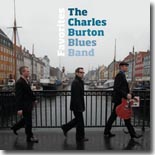 San
Diego bluesman Charles Burton Blues Band was
wrapping up a European tour when Burton hopped into
a studio in Sweden, and backed by a trio of native
Swedes laid down 11 of his all-time favorite songs
on the appropriately-named Favorites. It's a
decent album --- not one that you are going to rush
out to add to your collection, but a good
self-released CD that you'll likely pick up directly
from Burton during break time at one of his gigs.
San
Diego bluesman Charles Burton Blues Band was
wrapping up a European tour when Burton hopped into
a studio in Sweden, and backed by a trio of native
Swedes laid down 11 of his all-time favorite songs
on the appropriately-named Favorites. It's a
decent album --- not one that you are going to rush
out to add to your collection, but a good
self-released CD that you'll likely pick up directly
from Burton during break time at one of his gigs.
Burton is a good, basic blues guitarist and has a
good enough voice to handle the material here. It's
all familiar material --- perhaps too familiar, in
that do we really need another version of "Got My
Mojo Working" and "Key To The Highway"?
Ironically, Burton sounds best on his cover of
the pop number, "Spooky." Yeah, I know that sounds
strange, but it works here. He also does a nice
version of Lieber & Stoller's "Poison Ivy." For more
of a straight blues, the best effort here is Duke
Robillard's "Tell Me Whÿ."
If you can't get to one of Burton's gigs, the CD
is also available from his
website and from
CD Baby. Check it out!
--- Bill Mitchell